
The foreign relations of Sudan are generally in line with the Muslim Arab world, but are also based on Sudan's economic ties with the People's Republic of China and Russia.

Sudan–United States relations are the bilateral relations between Sudan and the United States. The United States government has been critical of Sudan's human rights record and has dispatched a strong UN Peacekeeping force to Darfur. Relations between both countries in recent years have greatly improved, with Sudan's post-revolutionary government compensating American victims of al-Qaeda terror attacks, the removal of Sudan from the State Department's blacklist of state sponsors of terrorism and the United States Congress having reinstated Sudan's sovereign immunity in December 2020.
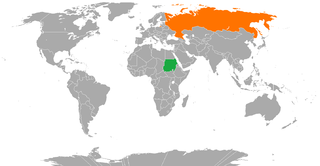
Russia–Sudan relations are the bilateral relations between Russia and Sudan. Russia has an embassy in Khartoum and Sudan has an embassy in Moscow.

The foreign relations of Bulgaria are overseen by the Ministry of Foreign Relations headed by the Minister of Foreign Affairs. Situated in Southeast Europe, Bulgaria is a member of both NATO and the European Union. It maintains diplomatic relations with 183 countries.
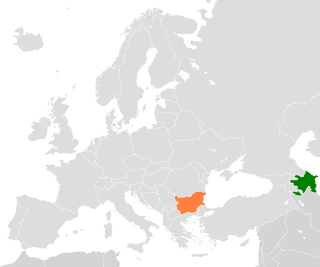
Bilateral relations exist between the Republic of Azerbaijan and the Republic of Bulgaria in political, socio-economic, cultural and other spheres. Cooperation is carried out in such areas as transport and transit of goods, tourism, pharmaceuticals, agriculture, science and high technologies, education, military equipment, etc. Both countries are full members of the BSCE and COE.
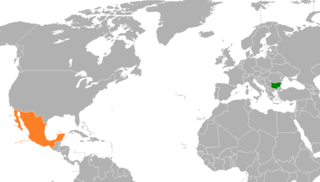
The nations of Bulgaria and Mexico established diplomatic relations in 1938. Both nations are mutual members of the United Nations and the World Trade Organization.
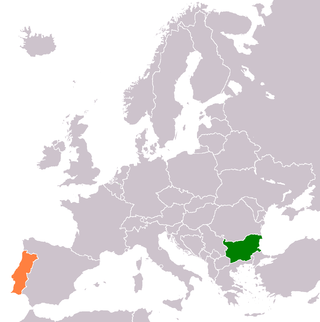
Bulgaria–Portugal relations are foreign relations between Bulgaria and Portugal. Diplomatic relations between both countries were established in 1925. They were severed in 1945 and were restored on 24 June 1974. Bulgaria has an embassy and an honorary consulate in Lisbon. Portugal has an embassy in Sofia. Both countries are full members of the Council of Europe, European Union and NATO. Portugal has given full support to Bulgaria's membership in the European Union and NATO.
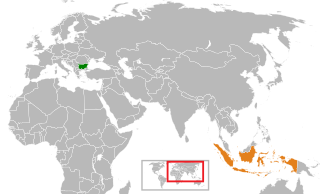
Bulgaria and Indonesia established diplomatic relations in 1956. Bulgaria has an embassy in Jakarta while Indonesia has an embassy in Sofia.

Bulgaria–Uzbekistan relations are foreign relations between Bulgaria and Uzbekistan. Both countries established diplomatic relations on September 12, 1992. Bulgaria has an embassy in Tashkent. Uzbekistan is represented in Bulgaria through a non resident ambassador based in Tashkent Both countries are full members of the Organization for Security and Co-operation in Europe.
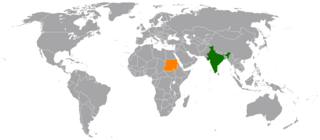
India–Sudan relations, also called Indian-Sudanese relations or Indo-Sudanese relations, refers to the international relations that exists between India and Sudan.

Malaysia–Sudan relations refers to the bilateral ties between Malaysia and Sudan. Malaysia has an embassy in Khartoum, and Sudan has an embassy in Kuala Lumpur. Both countries are members of the Organisation of Islamic Cooperation.

India–South Sudan relations are the bilateral ties between the Republic of India and the Republic of South Sudan. India recognised South Sudan on 9 July 2011, the day South Sudan became an independent state. India maintains an embassy at Juba, and South Sudan maintains an embassy in New Delhi.

Denmark–Sudan relations refers to the current and historical relations between Denmark and Sudan. Denmark is represented in Sudan, through its embassy in Addis Ababa, Ethiopia. Sudan is represented in Denmark, through its embassy in Oslo, Norway.

Iran–Sudan relations refers to diplomatic, economic and military relations between Sudan and Iran. For nearly three decades, Iran and Sudan enjoyed a close relationship.

China–South Sudan relations refers to the bilateral relations between the People's Republic of China and the Republic of South Sudan. China recognized South Sudan's independence on July 9, 2011.

Indonesia–Sudan relations was officially established in 1960. In February 2012, during a visit of Sudanese Foreign Minister Ali Karti to Jakarta, Indonesia and Sudan has agreed to foster bilateral relations in politics, science, education and economic sectors. Indonesia has an embassy in Khartoum, while Sudan has an embassy in Jakarta. Both countries have Muslim-majority population and both are members of Organisation of Islamic Cooperation.
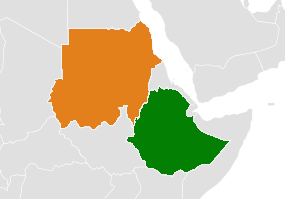
Ethiopia–Sudan relations date back to antiquity. One of Ethiopia's principal trade routes ran west to Sudan and then to Egypt and the Mediterranean. Muslim merchants from Sudan have been an important part of Ethiopia's trade for many centuries.

Qatar–Sudan relations are the bilateral relations between the State of Qatar and the Republic of the Sudan. Relations were first established in 1972, when Qatar inaugurated its embassy in Sudan's capital city, Khartoum. Both countries are members of the Organisation of Islamic Cooperation.

Spain–Sudan relations are the bilateral and diplomatic relations between these countries. Sudan has an embassy in Madrid. Spain has an embassy in Khartoum.
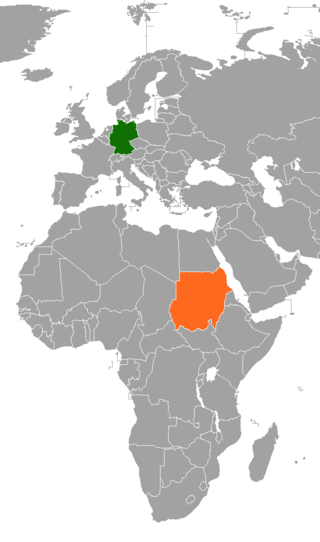
Germany–Sudan relations are the current and historical relations between Germany and Sudan. The Federal Republic of Germany was the first country to recognize Sudan diplomatically in 1956. Due to its mediating position in the various armed conflicts in the country, Germany is a trusted partner for Sudan.






















